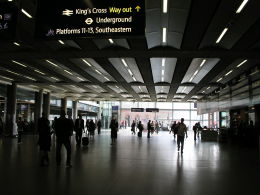Posted 8th March 2012 | 4 Comments
Greening takes first step in unveiling rail reforms

TRANSPORT SECRETARY Justine Greening has made a statement to MPs about the new railway Command Paper -- telling them that it will be called 'Reforming Our Railways: Putting The Customer First'.
The government wants to bring fares under control, reduce the effects of multi-agency railway administration and also bring costs down.
Ms Greening told the Commons: "The hallmarks of our railway must be high standards and low costs… a railway that offers the best services and the best value.
"That means a rail network which is efficient, effective and affordable.
"Nevertheless, in his Rail Value for Money Study, Sir Roy McNulty concluded that our railways are among the most expensive in Europe… and that’s in spite of the strong and steady growth in the number of passengers using them.
"Sir Roy identified inefficiencies worth £2.5 to £3.5 billion-a-year… and the people picking up the tab for this costly efficiency gap are passengers and taxpayers.
"So reform is long overdue. Passengers rightly want to know that we have a plan to end the era of inflation-busting fares seen over recent years.
"And taxpayers rightly want to see railway subsidy reduced to help us tackle the fiscal deficit.
"My message to everyone today is very clear. The days of spiralling and unjustified rail costs are coming to an end."
The review follows the publication last May of Sir Roy McNulty's 'value for money' railway report, in which he said that rail costs could be cut by 30 per cent -- some £1 billion annually -- by 2019.
Although some of his proposals have attracted searing criticism -- particularly the closure of booking offices at smaller stations -- Sir Roy had said that he was not recommending further real terms fare increases.
The Department for Transport has now issued a list of points covered by the Command Paper:
•Reducing and then ending above-inflation rises in average regulated fares as soon as possible;
•Expanding smart ticketing technology so that passengers across England and Wales can enjoy Oyster-style smartcard payment options and more flexible season tickets;
•Reforming rail franchises so that operators have to deliver more value and better levels of service for passengers while ensuring taxpayer subsidies are concentrated on safeguarding less profitable routes that remain crucial to communities;
•Investing in Britain’s capacity to grow jobs and prosperity by funding thousands more carriages, extending electrification of the rail network and redeveloping railway stations;
•Strengthening the rail regulator’s capacity to improve the passenger experience and oversee the crucial efficiency challenge;
•Involving rail workers in our plans to get the industry on a more sustainable footing, to grow jobs and to develop skills;
•Empowering passengers by providing better punctuality and real-time travel information.
Reader Comments:
Views expressed in submitted comments are that of the author, and not necessarily shared by Railnews.

David Day, Laddingford, Kent
Network Rail’s recent announcement of its £1.5bn framework agreements should reduce a good deal of the waste involved in tendering for projects and offer economies of scale.
As well as this streamlining of the procurement process, replacing traditional trackside signal sighting methods with accurate desktop-based signal sighting will play a small but significant role in saving some of the £3.5bn.
It would also help if the video footage and 3D models we create for the desktop signal sighting process could be reused throughout the life of the project, e.g. for public consultation meetings, marketing collateral and driver briefing material. Putting the project under one provider should greatly assist with this.
Morgan, Crawley Down
Some very good points made.
Yes to more electrifcation in the South West of England and Wales
Morgan, Crawley Down
Some good points.
Extending electrification of the rail network ie Basingstoke to Exeter, Southhampton to Salisbury, Paddington to Plymouth via Bristol and Westbury and also South Wales
Philip Russell, Carlisle
The fault of this financial turmoil lies mainly with DFT rail and its predecessors for having no long term costs plan ,whillst companies like Irish Rail invested in proven effencies like modern labour saving signalling systems and driver only operation our DFT was busy micro managing trivialities like the type of wi fi on trains and cycle racks on stations, whilst giving inefficient operators like south west trains(who ripped down its driver only equipment to to please the unions) a 10 year franchise extension.